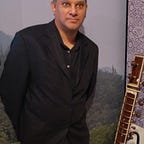Howards End with smartphones
Who does the most to help Bangladesh’s working classes? The reader or writer of a piece referencing an English novel from 1910, probably not.
How about the nation’s political institutions then?
No cynicism intended, Bangladesh’s political history is built on popular movements for freedom from colonialism, exploitation, injustice, and poverty.
Yet for the most part, politics, administration, and institutions are managed by, and largely for, the urban middle classes.
The question is rhetorical — Bangladesh’s working classes do the most to help themselves. Most people have never had, or rarely get, any choice but to toil hard and expect little.
The many also do much to help the few. Were it not for millions of farmers, migrant workers, and factory workers driving forward the nation’s economy, the affluence that sells cappuccinos for the price of a day’s wage, might be a rarer sight in Dhaka.
I refer to the title of EM Forster’s book because of its insightful descriptions of social attitudes in upper-middle-class Edwardian England. This much-studied text spins a tale about two well-off families — the artistic, cultured Schlegels and the less couth but more entrepreneurial Wilcoxes.
The liberal ideals of the former are sincere, but blind them to their own snobbery and privilege. The latter are more unthinkingly motivated by money and consumerism, but are not wholly unsympathetic. Both live comfortable lives, interacting only as needed with those outside their own circles.
An aspirational, educated, but impoverished clerk, Leonard Bast is drawn into their milieu and a convoluted drama ensues. The novel’s popularity and plot are driven by the question of which of the characters will inherit Howards End, the idealized country house of the title, widely read as a metaphor for England.
A 2017 television adaptation (which used far more of Forster’s text than the overblown Merchant-Ivory film, and is the better for it) triggered debate about the story’s continuing relevance, with novelist Phillip Hensher arguing that life would be harder for a modern-day Bast.
A touch pessimistic perhaps: Many of the causes championed by middle-class Victorian liberals were delivered during the 20th century with the evolution of universal suffrage and empowerment of working-class people.
If, despite such improvements, Howards End still resonates in England, it is simpler, surely, to see parallels in Bangladesh today.
Another traditionally deferential, often hierarchical, status-obsessed, and unequal society. But one where, despite enormous advances over the last century, not least in its very independence and the benefits conferred by new technology, a lot of important decisions about politics and society, even today, are largely shaped by Dhaka’s equivalents of the Schlegels and Wilcoxes.
Most of the population gets treated much as it always has been — a reservoir of cheap labour to be variously ignored, patronized, feared, and fobbed off.
A tradition of progressive politics does not translate into progress, if opinion formers and tax-payers don’t prioritize investment in public education. Only the naïve and impudent ever ask how it is a society that celebrates movements for language can be independent for two generations yet still have nearly one in three adults classed as illiterate.
A reckless waste of potential for a country that may need to feed 220 million people by 2050 in the face of climate change.
It’s not that Bangladesh lacks pioneers or progress. Sultana’s Dream, Begum Rokeya’s landmark utopian feminist novella, pre-dates Howards End by five years. And today, female role models abound across society.
But sexual discrimination, harassment, and violence are still far too often inflicted with impunity. Tellingly, the bureaucrats and lawyers who advise the nation’s politicians can’t even dream of removing sexist and outdated provisions from the 1860 Penal Code. But somehow, they find time to draft Sarkari Chakori Ain (prior permission needed to prosecute public servants) bills before elections.
Denial comes naturally to much of the metropolitan middle-class: “We earn an honest living, we never queue jump, we never pay bribes, we never ask our driver to break the rules,” runs an oft-stated mantra.
True as this is for many, most also have family and friends who do. Plutocrats can hoard more wealth, the working poor has many more votes, but the influence of the urban middle-class across academia, the civil service, bureaucracy, and business (not to mention the media) is inestimable.
For good and bad, they shape society. Simply “not being in politics” does not obviate the need to take responsibility, which requires thinking more deeply about Bangladesh’s democracy than merely measuring the outcome of elections.
Be it Article 70 hard-wiring the subjugation of MPs towards party leaders or the endurance of outdated, or never desirable, colonial laws and bureaucratic tendencies towards rule by paternalism tempered by distrust, there is a lot to think about — but little reason to suppose they will be addressed.
For most of the population after this month’s General Election, their social and political power will remain smaller than their numbers deserve — next year may as well be 1920, not 2019 — whoever wins.
(Dhaka Tribune op-ed 9 December 2018)
